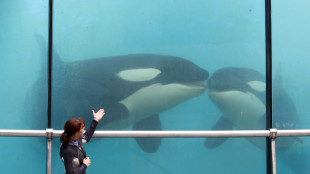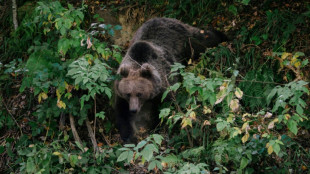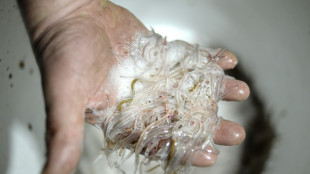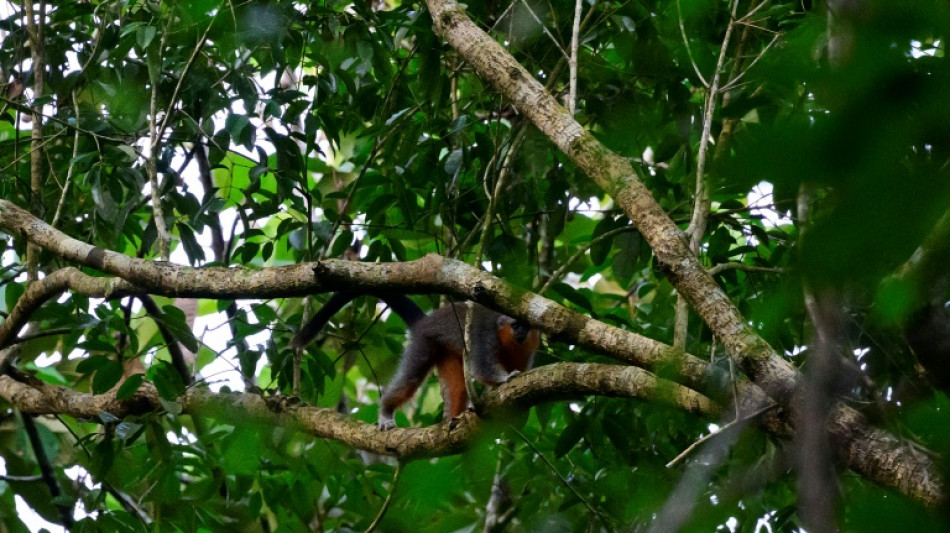
-
 Cash-strapped Nigerians turn to YouTube for entertainment
Cash-strapped Nigerians turn to YouTube for entertainment
-
Two dead as fans, police clash before Copa Libertadores game in Chile

-
 Flowers in their hair: Shan boys ordained into Buddhist monkhood
Flowers in their hair: Shan boys ordained into Buddhist monkhood
-
Edwards leads Wolves past Grizzlies as playoff race heats up

-
 Ancelotti questioned as Real Madrid face Alaves
Ancelotti questioned as Real Madrid face Alaves
-
Old foes Bayern and Dortmund face off amid spectre of European exit

-
 Early holiday, more fans: Philippines schools adapt to climate change
Early holiday, more fans: Philippines schools adapt to climate change
-
In skies, as on land, European forces face gaps if US pulls back

-
 Digital divas: Can Japan's virtual YouTuber craze crack America?
Digital divas: Can Japan's virtual YouTuber craze crack America?
-
WHO pandemic agreement talks face deadline crunch

-
 Stocks, dollar sink and gold hits record as Trump tariff panic returns
Stocks, dollar sink and gold hits record as Trump tariff panic returns
-
LeMond hails 'one in a million' Pogacar ahead of Paris-Roubaix debut

-
 Liverpool can move closer to the title as top five tension mounts
Liverpool can move closer to the title as top five tension mounts
-
Trump admits trade war 'cost' as markets hit

-
 AI only just beginning to revolutionize the NBA game
AI only just beginning to revolutionize the NBA game
-
Despite Trump pause, overall US tariff rate at highest in a century

-
 'A pain that doesn't subside' at funerals for Dominican nightclub disaster victims
'A pain that doesn't subside' at funerals for Dominican nightclub disaster victims
-
Panama deal allows US to deploy troops to canal

-
 US firm says it brought back extinct dire wolves
US firm says it brought back extinct dire wolves
-
Grieving Dominicans start burying 220 victims of nightclub disaster

-
 Aberg closes strong at 'sneaky hard' Augusta National
Aberg closes strong at 'sneaky hard' Augusta National
-
US auto union praises some Trump tariffs

-
 Australian IVF clinic admits embryo mix-up
Australian IVF clinic admits embryo mix-up
-
Rose: I've played well enough to win Masters but lack the jacket

-
 Rose again enjoys 'luxury' of first-round Masters lead
Rose again enjoys 'luxury' of first-round Masters lead
-
Rose rockets to Masters lead, defending champ Scheffler in pursuit

-
 Tesla opens first showroom in oil-rich Saudi
Tesla opens first showroom in oil-rich Saudi
-
Oscars to add new award for stunts

-
 Hatton loves being at Masters but 'It's just so hard'
Hatton loves being at Masters but 'It's just so hard'
-
'Mistakes can happen': Amorim backs Onana after Lyon nightmare

-
 RFK Jr says study will reveal cause of autism 'epidemic'
RFK Jr says study will reveal cause of autism 'epidemic'
-
Tourist family, pilot killed in 'tragic' NY helicopter crash

-
 No.1 Scheffler makes strong Masters start to defend title
No.1 Scheffler makes strong Masters start to defend title
-
Man Utd and Spurs draw in Europa League, Rangers hold Athletic

-
 Rose rockets to Masters lead with Scheffler and McIlroy in pursuit
Rose rockets to Masters lead with Scheffler and McIlroy in pursuit
-
Man Utd held late in Lyon after Onana errors in Europa League

-
 Man Utd held late in Lyon after Onana errors
Man Utd held late in Lyon after Onana errors
-
Wall Street rally fizzles as tariff fears resurface

-
 MLS to open 'second phase' of major season overhaul study
MLS to open 'second phase' of major season overhaul study
-
Argentina braves 24-hour strike as it awaits word on IMF loan

-
 Spain's Ballester finds relief in Masters water hazard
Spain's Ballester finds relief in Masters water hazard
-
Porro rescues Postecoglou as Spurs held by Frankfurt

-
 Grieving Dominicans start burying 200+ victims of nightclub disaster
Grieving Dominicans start burying 200+ victims of nightclub disaster
-
CONMEBOL proposes one-off 64-team World Cup in 2030

-
 Rybakina on form for Kazakhstan in BJK Cup
Rybakina on form for Kazakhstan in BJK Cup
-
Former Real Madrid coach Leo Beenhakker dies aged 82

-
 Rose rockets to top of Masters leaderboard, Scheffler one back
Rose rockets to top of Masters leaderboard, Scheffler one back
-
Langer fades after fiery start in Masters farewell

-
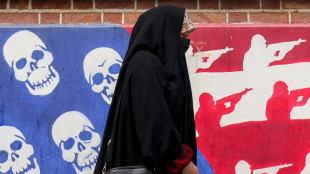 Iran, US raise stakes ahead of key talks in Oman
Iran, US raise stakes ahead of key talks in Oman
-
US-China confrontation overshadows Trump's 'beautiful' trade war


The race to save the Amazon's bushy-bearded monkeys
One morning in 2024, Armando Schlindwein found an orange-bearded monkey on the roof of his farmhouse on the edge of the Brazilian Amazon.
Never before had he seen one of the striking creatures emerge from the forest.
The monkey, a Groves' Titi, listed as "critically endangered" by the International Union for Conservation of Nature (IUCN), had ventured far from its fast-shrinking home on a hill in a small patch of forest next to Schlindwein's house.
Deforestation was eating away at its limited domain, and the monkey was trying to find an escape route for its family.
The encounter inspired Schlindwein to launch a reforestation drive to open a corridor for the monkeys to swing tree-by-tree back into the rainforest.
"This little creature is endangered. We need to do something to preserve it," said Schlindwein, a 62-year-old small-scale farmer in Sinop municipality, located within Brazil's central Mato Grosso state.
With the help of NGOs like the Ecotono Institute and the Movement of People Affected by Dams (MAR), Schlindwein and his neighbors last year planted seeds of 47 native tree species on a deforested hectare (2.5 acres) of his land.
Within five to seven years, they hope the new growth will have tripled the available space for this particular monkey family, made up of four adults and an infant.
"Saving them is a daily task," said Schlindwein of his cheeky charges.
- 'Nowhere to go' -
Known locally as zogue-zogue and by scientists as Plecturocebus grovesi, the house cat-sized Groves' Titi is found only in Mato Grosso state, and there are just a few thousand of them left.
It was listed as one of the world's 25 most endangered primates in the 2022/3 "Primates in Peril" report of the IUCN and other environmental groups.
A 2019 study cited in the report said the zogue-zogue had lost 42 percent of its forest habitat, a figure that could reach 86 percent in a quarter-century if nothing is done to halt its destruction.
"When offspring are born and need to migrate to continue the reproductive cycle, they have nowhere to go," Gustavo Rodrigues Canale, a primatologist at the Federal University of Mato Grosso, told AFP.
"Human action leaves them trapped in small forest fragments," he said.
Schlindwein's family of monkeys is curtailed to a patch of land the size of a polo field, in a region with the ignominious title "Arc of deforestation" for having the highest rate of Amazon forest destruction.
Farmers clearing land for soybeans and other crops are chiefly blamed for the forest's fate.
The "Primates in Peril" report suggested forest loss could be mitigated by the creation of reserves "and the replacement of large areas of chemical-dependent monocultures of commodity crops by more sustainable models of land use, such as agroforests and agroecological food production."
- 'Monkeys cannot cross' -
Deforestation is not the only threat to Schlindwein's monkey family.
Locals say one side of the animals' territory has been cut off by flooding from a nearby hydroelectric plant run by a company partly owned by French energy giant EDF.
"Here, there used to be a stream with trees, but the Sinop Hydroelectric Plant (UHE)... created a large lagoon that the monkeys cannot cross," says Anthony Luiz, spokesman for MAR, next to a body of water about 300 meters (984 feet) across.
Environmentalists also accuse the company of leaving felled trees to rot in the river, killing the fish.
In the dry season, the rotting wood is exposed, feeding forest fires that hurt and displace monkeys and other animals.
Sinop Energia, which operates Sinop UHE, told AFP the plant meets "all legal and environmental requirements."
It added that it "maintains permanent monitoring of water quality, aquatic and terrestrial fauna, and vegetation regeneration in the area" and had also launched a monitoring program for threatened primates, as required by law.
S.Leonhard--VB

